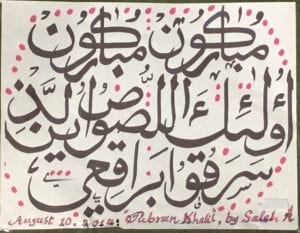Saleh Aldasouqi
East Lansing, Michigan, United States

One of the most enjoyable parts of my academic job is teaching. Interacting with medical students, residents, and fellows is a wonderful environment to practice medicine; and one particular fun part in teaching is interviewing for new training positions, residency, and fellowship.
Interviewing gives one a unique opportunity to meet people from all over the world; and the encounters have always been mutually educational, enlightening, and sometimes even entertaining. Occasionally, the interviewer would encounter a child (medical student or graduate) of an old friend or a graduate of the interviewer’s alma mater, but most are people with whom he had no prior connection. Quite often what remains after the interviews are the memories of the great discussions that occurred during them. There are always great stories and discussions that would make up volumes of writing.
As we scroll through the candidates’ training applications, we review their achievements, exam scores, and the personal statement. Many of these statements are generic, but some are unique and poignant such as the following:
“Work is love made visible. And if you cannot work with love but only with distaste, it is better that you should leave your work and sit at the gate of the temple and take alms of those who work with joy.” – Khalil Gibran
This was the opening line of the recent personal statement of a candidate for a position in our department. It led to a discussion with the candidate about Gibran, literature, poetry, Arabic language, and Arabic calligraphy during the interview.
Being a bilingual immigrant of Arabic descent myself, with a passion for my Arabic mother tongue, I enjoy interviewing candidates who speak Arabic. It provides an opportunity to speak my native language outside the house. Such interviews are often very fluid and bilingual, in English and Arabic, or sometimes as a mixed Arabic-English dialogue. The conversation turned to my passion for collecting scientific papers, memoirs, paintings, photos, and a few self-written Arabic calligraphy frames, some hanging on my office walls and window.
I shared with the candidate a piece of Arabic calligraphy (Figure) which is a quotation from Gibran’s book The Madman and says: “Blessed, blessed are those thieves who stole my masks.” This small book is a collection of philosophical parables and poems, available in English and in Arabic. As a Lebanese immigrant around the turn of the twentieth century, to my understanding, Gibran first wrote the book in English, and later some Lebanese authors translated it into Arabic.
Years ago I had read only one poem by Gibran, “On Children,” brought to my attention by a colleague who had lost an adult son. But I became familiar with the quotation from The Madman when a coworker said that a friend of hers was looking for someone who could create Arabic calligraphy. I met this gentleman at a local Middle Eastern restaurant, and over dinner he regaled me with stories of his half-Arabic-half-Irish heritage. He was a second generation American whose Arabic parent spoke little Arabic and taught him very little of the language. Now as a husband and a father of two young children he was longing to celebrate his Arabic roots. He came across this quote of Gibran’s, and was looking for someone to translate it into Arabic and write it in classical Arabic calligraphy. I did so, and he was thrilled with the calligraphy. The quote reminds him every day to be true to himself, and he plans to speak fluent Arabic someday.
Another time I met an American colleague who had no Arabic roots or connections. His first name was Khalil, but his family name was typically American. I knew that some Americans have Arabic first names such as Omar or Abdul, but I thought that Khalil was unique and asked him about it. A healthcare professional in his mid-thirties, he said that his late father was a big fan of Khalil Gibran.
America is such a wonderful place where cultures and languages from all corners of the planet blend, and as I continue to interview candidates I look forward to more enlightening stories from other parts of the world.
SALEH ALDASOUQI, MD, FACE, ECNU, is an Associate Professor of Medicine, Chief of the Endocrinology Division, and Former Endocrinology Fellowship Associate Director in the Division of Endocrinology, Department of Medicine at Michigan State University College of Human Medicine.

Leave a Reply